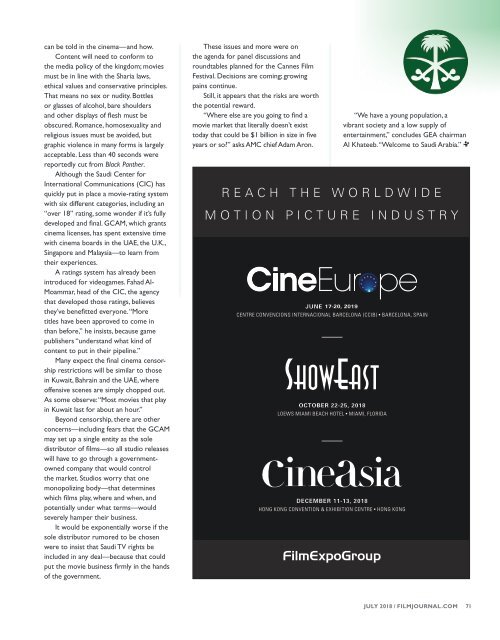You also want an ePaper? Increase the reach of your titles
YUMPU automatically turns print PDFs into web optimized ePapers that Google loves.
can be told in the cinema—and how.<br />
Content will need to conform to<br />
the media policy of the kingdom; movies<br />
must be in line with the Sharia laws,<br />
ethical values and conservative principles.<br />
That means no sex or nudity. Bottles<br />
or glasses of alcohol, bare shoulders<br />
and other displays of flesh must be<br />
obscured. Romance, homosexuality and<br />
religious issues must be avoided, but<br />
graphic violence in many forms is largely<br />
acceptable. Less than 40 seconds were<br />
reportedly cut from Black Panther.<br />
Although the Saudi Center for<br />
International Communications (CIC) has<br />
quickly put in place a movie-rating system<br />
with six different categories, including an<br />
“over 18” rating, some wonder if it’s fully<br />
developed and final. GCAM, which grants<br />
cinema licenses, has spent extensive time<br />
with cinema boards in the UAE, the U.K.,<br />
Singapore and Malaysia—to learn from<br />
their experiences.<br />
A ratings system has already been<br />
introduced for videogames. Fahad Al-<br />
Moammar, head of the CIC, the agency<br />
that developed those ratings, believes<br />
they’ve benefitted everyone. “More<br />
titles have been approved to come in<br />
than before,” he insists, because game<br />
publishers “understand what kind of<br />
content to put in their pipeline.”<br />
Many expect the final cinema censorship<br />
restrictions will be similar to those<br />
in Kuwait, Bahrain and the UAE, where<br />
offensive scenes are simply chopped out.<br />
As some observe: “Most movies that play<br />
in Kuwait last for about an hour.”<br />
Beyond censorship, there are other<br />
concerns—including fears that the GCAM<br />
may set up a single entity as the sole<br />
distributor of films—so all studio releases<br />
will have to go through a governmentowned<br />
company that would control<br />
the market. Studios worry that one<br />
monopolizing body—that determines<br />
which films play, where and when, and<br />
potentially under what terms—would<br />
severely hamper their business.<br />
It would be exponentially worse if the<br />
sole distributor rumored to be chosen<br />
were to insist that Saudi TV rights be<br />
included in any deal—because that could<br />
put the movie business firmly in the hands<br />
of the government.<br />
C<br />
M<br />
Y<br />
CM<br />
MY<br />
CY<br />
CMY<br />
K<br />
These issues and more were on<br />
the agenda for panel discussions and<br />
roundtables planned for the Cannes <strong>Film</strong><br />
Festival. Decisions are coming; growing<br />
pains continue.<br />
Still, it appears that the risks are worth<br />
the potential reward.<br />
“Where else are you going to find a<br />
movie market that literally doesn’t exist<br />
today that could be $1 billion in size in five<br />
years or so?” asks AMC chief Adam Aron.<br />
FE17_172x145_bleeds.pdf 1 1/15/18 2:14 PM<br />
17-20, 2019<br />
“We have a young population, a<br />
vibrant society and a low supply of<br />
entertainment,” concludes GEA chairman<br />
Al Khateeb. “Welcome to Saudi Arabia.” <br />
JULY <strong>2018</strong> / FILMJOURNAL.COM 71<br />
068-077.indd 71<br />
5/23/18 3:41 PM

















